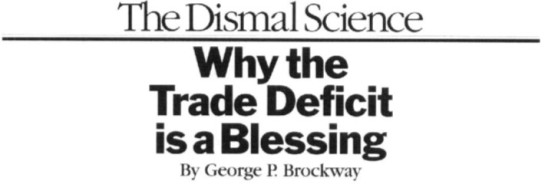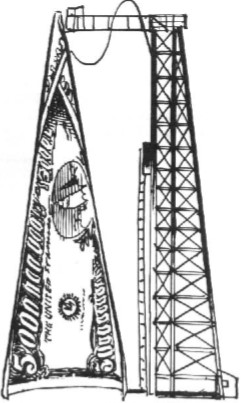Why the Trade Deficit is a Blessing
By George P. Brockway, originally published July/August 2001[1]

FOR YEARS almost beyond counting we had the budget deficit to worry about and argue over, and for some 30 years we have also had the foreign trade deficit. Many thought the two went together, like the proverbial horse-and-carriage. But the budget deficit has gone away[2] (with consequences yet to be discovered); the trade deficit is still with us and growing practically every day.
The reason for its robustness is that we import more goods and services than we export-and have done so every year, with few exceptions, since the early 1970s. We pay for our excess imports by using dollars to acquire the necessary amounts of the exporters’ currencies, or by paying directly in dollars. Consequently, our trade deficit has risen in dollars-a growing total now approaching 1.5 trillon of them.
The countries we are importing from do not buy more of our goods and services with those dollars (that’s how the deficit developed in the first place). They buy our bonds and stocks and other assets. If their purchases are wise or lucky, further streams of dollars swell their accounts. One way or another, our dividend and interest payments to foreigners now run more than $10 billion annually.
In October 1998 Congress appointed a bipartisan United States Trade Deficit Review Commission to study the imbalance. Last November (2000) the commission issued its report. All 12 members agreed the trade deficit is a problem of the utmost seriousness that threatens the welfare of the nation and the whole world.
The chairman of the commission (and leader of its six Republicans) wrote, “Large and growing trade deficits are neither desirable nor likely sustainable.” The vice chairman (and leader of the Democratic contingent) wrote, “It is simply irresponsible to ignore the huge threats that the growing trade deficit could pose to our economy.”
Those are pretty strong words; yet I am here to tell you there is exceedingly little chance that the ominous but unspecified disasters will befall us. Indeed, although I believe our trade deficit will continue to grow, I will argue that it is a blessing for us and for the world. My confidence is based on a simple reality: All the nations of the modern world need petroleum, and only a few have enough natural supplies to satisfy their needs.
Art Buchwald once wrote that when the petroleum-producing Arabs sent their sons to the United States for higher education, we made the serious mistake of directing them to Harvard Business School instead of Slippery Rock Teachers College, where they might have learned how to play basketball. As it happened, the second-generation petroleum producers somewhere learned to play OPEC. It is quite possible that their teachers were the Western oil companies and the Western central banks (including the Federal Reserve), who in the 1950s and ‘60s smugly rebuffed Arab pleas, first for rational drilling and pumping programs, and then (after the Arabs nationalized their oil fields) for rational terms for what their generally arid lands wanted to buy in Western markets. No doubt they were greedy. So were we. In the end they learned how to play the OPEC game very well.
Their smartest move was to agree to sell their petroleum exclusively for dollars. At first glance this decision certainly seems quixotic, given the coolness between them and us because of our support of Israel. On reflection we see that making the dollar the petroleum market’s international currency allows them to pose as modern men too business like to hold a grudge, and also enables them to avoid being skinned alive by the international money speculators.
Under an open system, they would be in a continuous frenzy trying to determine how much each of the world’s currencies was worth to them every minute of the day. Speculators would make (and no doubt occasionally lose) fortunes trying to outmaneuver them. Under the present system, they need worry solely about what a dollar is worth to them, or how many barrels of oil they have to sell today in order to get the dollars they need today.
The dollar is uniquely qualified to play this role because our trade deficit means that there are many billions of dollars sloshing about in the world. No other currency can or will make that claim. The two economies large enough to think of doing it are Japan and the European Union (EU), and both are forbidden to attempt it by their economic theories.
Let no one imaging that economic theory is just hot air. Japan, profusely praised by Wall Street for saving rather than consuming, has saved itself into a decade of stagnation that shows no sign of ending. As for the EU, it is run by bankers who pride themselves on tightly controlling all sorts of deficits.
IN SHORT, if you want a truly international currency you cannot do better than the United States dollar. Our supply-siders have tried to charm us into becoming compulsive savers like the Japanese, and the neoclassical economist of the “Washington Consensus” continue to scold that we don’t save enough, but we remain a nation of carefree spenders. Because we are the largest importers and the largest exporters in the world, dollars circulate widely around the globe. More to the point, we are the world’s biggest importer of petroleum and possibly the biggest exporter of agricultural produce the petroleum-producing nations need, plus military material they think they must have.
So the dollar was chosen, and the petroleum-thirsty nations found themselves having to harvest it-not merely for their day-to-day purchases, but also as reserves to help protect themselves from sudden assaults on their currencies, and to ensure that they can buy at least their share of petroleum until the Arabian sands run dry. At the moment the dollar reserves of these nations are slowly and surely reaching $1.5 trillion.
Yes, the figure for our trade deficit is in the same ball park. In fact, if you add the foreign investments in our real estate and newspapers and book publishing and agribusiness and automobile manufacturing and the rest to the sum of foreigners’ dollar reserves, you will find the total is actually on the same yard line as our trade deficit.
 Where else could it be? Aside from some of the deficit dollars being hidden in mattresses or mislaid in “statistical discrepancies,” there is no place else for it. The mathematics is simple and indefeasible[3].
Where else could it be? Aside from some of the deficit dollars being hidden in mattresses or mislaid in “statistical discrepancies,” there is no place else for it. The mathematics is simple and indefeasible[3].
Moreover, no country’s finance minister is likely to tamper with his or her dollar reserves at the risk of collapsing the country’s finances altogether. And if they all tried to tamper at once (as the Congressional commission’s scenarios suggest), their mutual competition would result in their getting poor value for their money.
Please note that this story is historically sound. Our trade deficits were few and insignificant before the 1970s, when OPEC firs showed its power, and they have increased along with the world demand for petroleum, and hence for dollar reserves.
The foregoing is, I submit, a stunning conclusion. Consider some corollaries:
- Our trade deficit is caused by foreigners’ need for dollars, not by our inability to produce goods the world wants at prices it is willing to pay. All the complaining about the alleged failure of our school system, the power of our labor unions, the greediness of our rich, the general fecklessness of our society-and there is much complaining in the commission’s report-is beside the point. The criticisms may be justified; that is another question. But they are not the cause of our trade deficit.
- If we could somehow manage to increase our exports and decrease our imports enough to erase the deficit, we would upset the international economy-and ours. To be sure, the nations of the world are able to get dollars from one another, but because they are all in the same boat, they must, in the aggregate, trade enough of their goods to us for dollars to maintain their reserves and to increase them as their economies expand.
- Since the 1970s our bankers and mainstream economists have been saying that we save too little to finance our economy, that we have to attract foreign investors by offering high interest rates[4]. The foreign nations must put their dollar reserves where they will be both safe and liquid, though, an nothing satisfies these requirements so well as U.S. Treasury bonds. Ergo, the high interest rates are not now, and never have been, necessary to attract foreign capital, that comes to us anyhow. But they have kept our unemployment rate higher than it otherwise would have been and thereby widened the debilitating gap between the haves and the have-nots of our society, not to mention adding to the cost of debt services.
IF WE HAVE high interest rates (and for the past 30 years they’ve been higher than in any other third of a century in our history), it is not because the Federal Reserve Board has been “forced,” as they like to say, to impose them. Rather, it is because the Reserve has misread the state of the world and its own economic theory.
The theory in question is that of the gross domestic product or the gross national product. It doesn’t matter which; in both cases exports are a positive factor, while imports are a negative factor. Accordingly, a trade deficit-that is, and excess of imports-decreases the domestic or national product and should be avoided.
The key word is “product” or output. The GDP never was intended to be a measure of consumption or satisfaction or quality of life. For example, petroleum is probably our largest import, would our quality of life be improved if we eliminated it? In some ways, yes; and perhaps eventually, yes. But here and now, surely not. And think of all the natural products we import-bauxite and tungsten and uranium, and tea and coffee and bananas. Would our quality of life be better without them? And suppose we could not import unique articles like works of art and antiquities for our museums and our personal pleasure. In the other direction, would our quality of life be better if we exported all our wheat or all our silicon chips?
As you can see, a trade deficit can be greatly to our advantage, if not a necessity. The advantage becomes a fortuitous blessing when we realize that all we have to do to enjoy it is to maintain a growing economy and restrain the Federal Reserve from going off in blundering pursuit of a misunderstood theory.
Imports are a disadvantage to us to the extent that they prevent the development of industrial or commercial opportunities we might have exploited ourselves, thus reducing our output by causing underemployment of our capital and labor. But if our labor and capital are fully employed, every increase in imports can be an increase in our quality of life.
Again, recent history is suggestive. The latter 1990s seemed like the storybook time of Goldilocks. Unemployment fell, capital investment rose, and prices were comparatively steady because the interest rate was comparatively steady from 1995 to June 1999. True, the trade deficit continued to rise, yet we continued to prosper.
TO COVER all the bases, it should be observed that there is also a cultural dimension to the trade deficit. Many even find its economic aspect less alarming than how much of our economy foreigners have come to own.
Of particular interest to me is book publishing, about 90 percent of which-after the sale of Houghton Mifflin to France’s Vivendi International– is now said to be controlled by six conglomerates, five of them in foreign hands. Publishers have always been a bit smug about being engaged in an ostensibly cultural endeavor that at least sometimes makes money. Lately they have been flattered by sociologists who call them gatekeepers of the realm of ideas and values. (I was brought up to believe values are more likely to be solid if ideas circulate freely, but let that pass.) At any rate, some feel that barbarians are currently not only at the gates but in charge of them.
How did the foreigners get to be our gatekeepers? They bought the gates, of course, and they bought them from Americans with dollars. There is nothing in such transactions to indicate that the buyers are less responsible than, or more corrupt than, or even very different from the sellers. If the buyers are barbarians, the chances are that the sellers were, too. Or both may have been praiseworthy.
In the 1930s and ‘40s, it seemed as though almost all the number one bestsellers were published by Doubleday, Simon and Schuster and Macmillan, with occasional assists from Scribner’s, Harper’s, Viking and Little, Brown. And for a while it seemed as though the number one best-selling fiction writer was Margaret Mitchell, and the number one best-selling nonfiction author was always named Dale Carnegie. Although the names and numbers are different today, the situation is not dissimilar. No one has ever pretended that best-sellers were necessarily best by any other standard.
It will be noted that all the publishers named above have been sold and resold and conglomerated in one way or another, mostly to Germans, Australians, or Brits. I’m not one to say that they are worse (or better) gatekeepers than those who sold out, though I have made a case (see the new edition of The End of Economic Man-advt.) that things are better for workers (and for the economy) if their firm is employee-owned.
In a conglomerating world, however, it makes a little difference to workers who their employer is, provided they are treaded decently and paid fairly. Nor does it make much difference to consumers who produces the commodities they buy, so long as the quality and price are right and child labor is not brazenly required. The government will be satisfied with any firm so long as it is law-abiding, generally abjures petty fraud, and pays its taxes. As for investors, they have already indicated by their eagerness for capital gains that they don’t care who the gatekeepers are.
Furthermore, if there actually were some sense to the gatekeeping metaphor-if a gatekeeper undertook to corrupt our society-we could protect ourselves by not paying attention to his (or her) product. Corruption is like the tango: it takes two to do it. A corrupter without a willing corruptee is little danger to anyone. If there is a problem here, it is our willing corruptees.[5]
None of this should be astonishing. After all, America was built with foreign investments. Except for a few months immediately before (yes, before) the onset of the Depression of 1837, we were a debtor nation from 1776 until World War I. We prospered in those prewar years. Why should we not prosper now as we become a debtor nation again?
Finally, lets try to put the size of the problem (if anyone still thinks it is a problem) in perspective. It has take us roughly 30 years to run up a trade deficit gradually approaching $1.5 trillion. That’s less than a fifth of our GDP. The stock exchanges can and do lose that kind of money in a couple of weeks, and what is lost on the exchanges is gone and lost forever. By contrast, our trade deficit is a debt for which we received value, and from which the world economy benefits, but which we may never be asked or even permitted to discharge as long as OPEC pumps petroleum.
The New Leader
[1] Ed: This article was written before there was a Euro, before the US returned to being a net exporter of energy, before the expansion of wind and solar energy, before China grew to the largest economy. As a result, many of the assumptions here no longer hold. Someone smarter than I will have to say if the arguments presented are stronger or weaker.
[2] Ed: This article was published at the end of the Clinton Presidency when the annual federal budget WAS balanced
[3] Ed: re: the first footnote, this suggests the arguments still hold (though I haven’t done the research)
[4] Ed: This claim has certainly been undone by the era of “quantitative easing” where interest rates were zero, and in certain places and times, negative.
[5] Ed: its as if in 2001 the author could foresee Fox News, Laura Ingraham, and David Hogg.